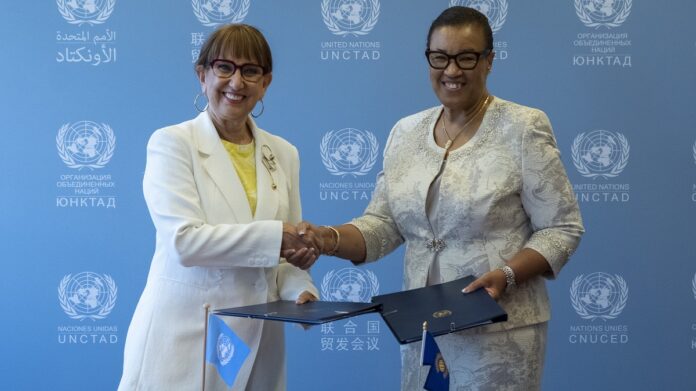
The Commonwealth Secretariat and The United Nations Conference on Trade and Development (UNCTAD) signed a five year agreement to curb plastic pollution and promote ocean economy in line with the COP26 resolution of clean and safer environment.
The two organisations will broaden their existing cooperation through the signed memorandum of understanding (MoU) which seeks to promote the ocean economy, curb plastic pollution, support least-developed countries, bolster the digital economy and boost gender equality.
The MoU which was signed at the UNCTAD Headquarters in Geneva will further strengthen the two organisation’s cooperation in various areas of work and developing countries will also be included by the five year support.
The five-year agreement brings together the Commonwealth Secretariat’s experience in programmes and policymaking and UNCTAD’s research, analysis and policy work, to help countries make progress towards the Sustainable Development Goals (SDGs).
Commenting on the Five year agreement the Commonwealth Secretary-General, The Rt Hon Patricia Scotland QC, said globally must embrace the SDGs which seek to address challenges of food insecurity and climate change which mostly affect developing countries.
“I am delighted that we have renewed our partnership to support our members, especially small island states and least developed countries, to achieve the SDGs. With the world facing multiple crises from climate change to food insecurity, partnerships like ours are indispensable to help tackle these challenges.”
Adding on she also said the stronger collaboration would enable the two organisations to contribute more to global efforts to tackle the multiple crises facing the world. She said:
“We are pleased to expand our partnership and open a new phase of cooperation in which we will amplify our joint efforts in supporting developing countries to take coordinated action to address cascading crises and build a better future together.”
The new MoU builds on a decade-long collaboration between the two organisations.
They have worked together on issues related to fisheries, the ocean economy, plastic pollution, least developed countries’ graduation and vulnerability and ensuring trade is part of the solution to the climate crisis.
Under the MoU, the Commonwealth Secretariat and UNCTAD will continue to co-organise the biannual UN Oceans Forum, a key meeting on conserving and sustainably using the sea and its resources.
They will share data and information on the development and use of ocean-based goods and services.
They will also promote the ocean-based blue economy and circular economy, particularly in relation to fisheries, climate change and plastic pollution.
Besides, they will assist member states in enhancing their green production and export capacity, as well as enabling a sustainable energy transition in developing countries.
The Commonwealth Secretariat and UNCTAD will work on strategies to reduce poverty in vulnerable developing nations, especially least developed countries and small island developing states.
The two organisations will collaborate on research and vulnerability assessments and organise workshops on poverty, absorptive capacity and inequality issues affecting developing countries.
To tackle the debt crisis in developing countries, they will enhance reporting tools to support the new requirements of the World Bank’s external debt reporting system.
The two organisations will also collaborate on implementing standards and best practices to help vulnerable economies manage debt sustainably and transparently.
The cooperation agreement also covers work to promote women’s economic empowerment, investment for development, e-commerce, and the digital economy.
The two organisations last signed the agreement in 2017 on achieving the trade-related aims of Sustainable Goal Development 14, specifically around conserving and sustainably using the sea and its resources.
The working relationship will also see the Commonwealth and UNCTAD supporting other partners to increase transparency and address non-tariff barriers that affect the expansion of regional and global value chains in the fisheries and oceans economy sectors. The aim is for this to enhance economic benefits by 2030, which will directly benefit many of the Commonwealth’s Small Island Developing States.










